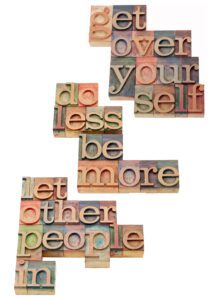 More and more people are hearing about EMDR and are wanting to change the way they see themselves. When we’re looking at EMDR for this instead of a specific traumatic event, we’re looking at the maladaptive beliefs developed in childhood. Or by another name, our core beliefs.
More and more people are hearing about EMDR and are wanting to change the way they see themselves. When we’re looking at EMDR for this instead of a specific traumatic event, we’re looking at the maladaptive beliefs developed in childhood. Or by another name, our core beliefs.
These negative core beliefs often develop via what I like to call ‘relational trauma’. In other words, trauma that comes from within our relationships with other people.
Let’s say you have parents who want the best for you and have high expectations, giving you praise for your achievements but not much else. You could develop a core belief that you have to be perfect to be loved, or that you have to be exceptional to be worthwhile.
Or maybe you had a sibling who was chronically sick or had intense behavioural issues. You could develop the core belief that you have to be the good boy/girl or that your needs don’t matter, or that you have to be no trouble to get on in life.
You can see by these examples that you don’t have to have something really terrible directed at you to form these unhelpful beliefs. But of course sometimes you do.
You may have had parents or siblings that teased you. Maybe they called you fat, or stupid, or told you were adopted to the point you believed them. You would most likely be feeling not good enough at the very least and maybe had feelings of not belonging.
Maybe you had an angry alcoholic parent who was very unpredictable. You would most likely have a core belief that says you’re not safe.
The way to start to delve into what your core beliefs are is to start to look at what unhelpful things you say to yourself on a regular basis. For example, “that person is so much better than me” might indicate something along the lines of “I’m not good enough”.
You can also look for how you feel when you encounter something that challenges you. For example, you might look in the mirror and feel disgust. There’s probably something going on in the background that is a result of the teasing I wrote about or maybe “I have to be perfect”. If you have those uncomfortable feelings you can dig deeper into what you’re saying to yourself internally.
Identifying core beliefs can be helpful even if you want to do your own therapy. Recognising what negative things we’re saying to ourselves, can give us some freedom. If we make these conscious, we have the choice of whether we respond to them or not. For example, if were teased that we were fat as a kid and we’re looking in the mirror and feeling gross, we could recognise that these were just mean kid’s words and we don’t need to believe them or listen to them anymore.
BTW this is harder than it sounds but it WILL pay off over time.
So spend some time identifying your core beliefs and start working on disengaging from them. You will start to feel better.
